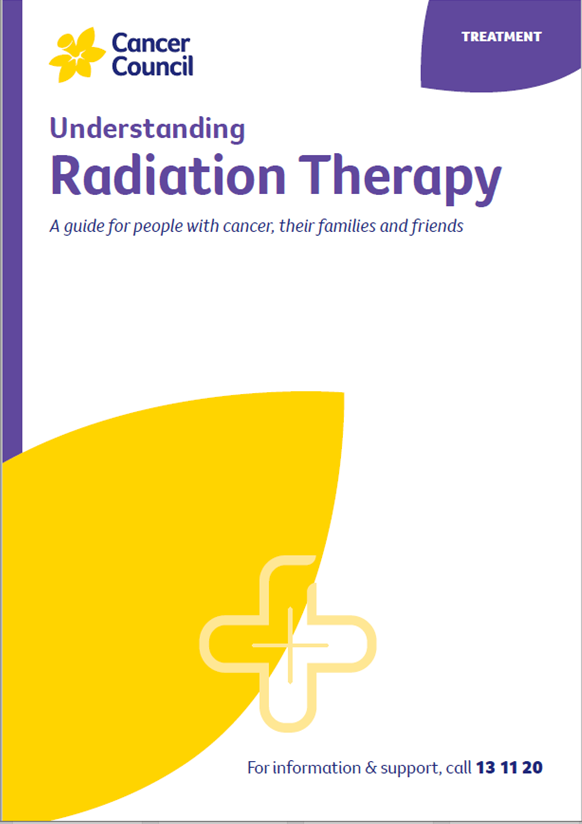- Home
- Pleural mesothelioma
- Treatment
- Radiation therapy
Radiation therapy for pleural mesothelioma
Radiation therapy (also sometimes called radiotherapy) is the use of targeted radiation to kill or damage cancer cells so that they cannot grow, multiply or spread.
Learn more about:
- Overview
- Having radiation therapy
- Side effects of radiation therapy
- Video: What is radiation therapy?
Overview
Many other types of cancer may respond well to radiation therapy. It can be more difficult to target radiation therapy for mesothelioma because the cancer is often spread over a large area.
However, radiation therapy may still be used at different stages of treatment for pleural mesothelioma and in different ways:
- as palliative treatment to relieve pain or other symptoms caused by tumours and improve quality of life
- after chemotherapy and surgery (adjuvant radiation therapy) to help kill any remaining cancer cells.
Having radiation therapy
| Planning your radiation therapy | Treatment is carefully planned to destroy as many cancer cells as possible while causing the least harm to your normal tissue. |
| Simulation and preparation | The initial appointment to map out the treatment (simulation) may take a few hours. You will have CT scans of the affected area, and your skin may be marked with a special ink. This makes sure that the radiation is directed at the same place on your body every time you receive radiation therapy. The ink may be permanent, but is only the size of a freckle. Tell someone if you are worried about this. |
| How radiation therapy is given | Radiation therapy is usually every day, Monday to Friday, as an outpatient (you don’t stay in hospital). A session usually lasts about 20 minutes – the radiation therapists have to set up the equipment and position you, but the treatment itself takes only a few minutes. Radiation therapy doesn’t hurt and you aren’t radioactive afterwards. |
| Length of the treatment | The length of the treatment course will vary depending on the purpose of radiation therapy. It might involve 1–10 sessions for up to 2 weeks for palliative treatment, or longer if radiation therapy is combined with other treatments with the aim of long-term control. |
Side effects of radiation therapy
Radiation therapy may cause various side effects during treatment or shortly afterwards, but most side effects go away after the treatment stops.
Depending on the area of the body being treated, side effects can include:
- fatigue
- peeling, cracked skin that looks red or sunburnt and may be uncomfortable
- painful swallowing
- loss of hair in the treatment area.
Radiation therapy to the chest area can cause difficulty swallowing and symptoms of reflux for a few days or weeks, sometimes leading to weight loss. If high doses of radiation therapy are given to the chest area, it may cause permanent changes (fibrosis) in the lung tissue.
Learn more about radiation therapy.
→ READ MORE: Trimodality therapy for pleural mesothelioma
Video: What is radiation therapy?
Watch this short video to learn more about radiation therapy.
Podcast: Making Treatment Decisions
Listen to more episodes from our podcast for people affected by cancer
All updated content has been clinically reviewed by A/Prof Anthony Linton, Medical Oncologist, Concord Cancer Centre and Concord Repatriation General Hospital, NSW; Dr Naveed Alam, Thoracic Surgeon, St Vincent’s Private Hospital Melbourne and Monash Medical Centre, VIC; Prof David Morris, Peritonectomy Surgeon, St George Hospital and UNSW, NSW. This edition is based on the previous edition, which was reviewed by the following panel: A/Prof Anthony Linton (see above); Dr Naveed Alam, (see above); Donatella Arnoldo, Consumer; Polly Baldwin, 13 11 20 Consultant, Cancer Council SA; Dr Melvin (Wee Loong) Chin, Medical Oncologist, Sir Charles Gairdner Hospital and National Centre for Asbestos Related Diseases, WA; Prof Kwun Fong, Thoracic and Sleep Physician and Director, UQ Thoracic Research Centre, The Prince Charles Hospital, and Professor of Medicine, The University of Queensland, QLD; Vicki Hamilton OAM, Consumer and CEO, Asbestos Council of Victoria/ GARDS Inc., VIC; Dr Susan Harden, Radiation Oncologist, Peter MacCallum Cancer Centre, VIC; Penny Jacomos, Social Worker, Asbestos Diseases Society of South Australia, SA; Prof Brian Le, Director, Parkville Integrated Palliative Care Service, The Royal Melbourne Hospital and Peter MacCallum Cancer Centre, VIC; Lung Cancer Support Nurses, Lung Foundation Australia; Jocelyn McLean, Mesothelioma Support Coordinator, Asbestos Diseases Research Institute, NSW; Prof David Morris (see above); Joanne Oates, Registered Occupational Therapist, Expert Witness in Dust Diseases, and Director, Evaluate, NSW; Chris Sheppard and Adam Barlow, RMB Lawyers.
View the Cancer Council NSW editorial policy.
View all publications or call 13 11 20 for free printed copies.
